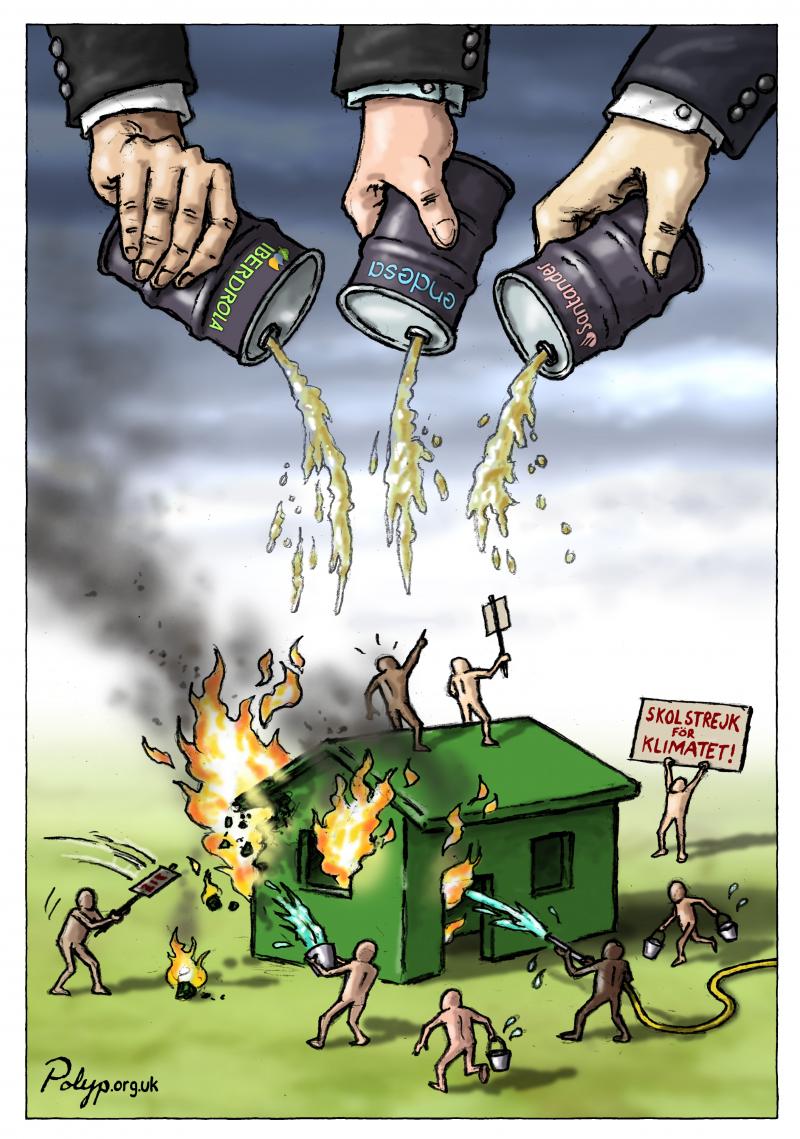
Corporate COP25: the biggest failure so far?
CEO spent a very busy two weeks at COP25 in Madrid in December, working with inspiring allies in the fight for climate justice and exposing the role of corporations in co-opting the UN climate talks and derailing the process. The following article gives you the low-down on what we got up to, and covers some of the key developments during the talks.
Introduction
COP25 in Madrid – the longest on record – has finally ended. But even with the extra time, and despite the fact that the terrifying impacts of climate change around the world were headline news throughout 2019, veteran COP-watchers say that it was the worst climate summit ever. Polluting industries prevailed while the millions of people already suffering from the impacts of climate change, along with a huge youth presence inside the UN halls, were utterly ignored. The last-minute relocation of the COP to Madrid from Santiago, Chile – due to widespread anti-austerity and anti-government protests there – should have underlined how any solution will need social as well as climate benefits. Yet this reality was brushed under the carpet by slick corporate PR campaigns, further distancing the negotiations from what is actually happening on the ground.
COP25 was a corporate COP from the outset. The main item on the agenda was carbon markets (known as ‘Article 6’ in the negotiations). Carbon markets are the favourite emissions-cutting tool promoted by the likes of Shell, BP and ExxonMobil because they allow the continued extraction of fossil fuels, with emissions ‘offset’ through tree planting or other activities. Just as at previous COPs, carbon markets were enthusiastically championed by the EU, the US and Australia, in line with the lobby demands of their biggest fossil fuel firms. Also on the agenda was finance: who will pay for the climate disasters already happening today (code-named ‘loss and damage’ in the talks)? Will rich nations – and their complicit corporations – be held liable, or will those countries and communities that have done the least to cause the problem keep footing the bill?
In the end, no decision was taken on either carbon markets or finance. Ultimately countries in the global South decided no deal was better than a bad deal, with the fight resuming next year at COP26 in Glasgow. Nonetheless, for anyone who followed the two weeks of negotiations it was clear that corporate interests triumphed, and that they succeeded in creating a dangerous distraction from the key task: leaving fossil fuels in the ground. Inside the talks but also outside, the voices of youth, indigenous communities, women and non-binary folks, trade unions and environmental NGOs calling for real climate solutions were continuously shut down and marginalised.
The overt face of corporate influence: sponsorship
Thanks to the Spanish government, COP25 in Madrid was sponsored by some of the country’s biggest polluters. President Pedro Sánchez and his Minister for the Ecological Transition, Teresa Ribera, asked each of the 35 biggest companies listed on the Spanish stock exchange (the IBEX 35) for a contribution of €2 million. The government claimed that the money was needed to host the talks, but it subsequently transpired that it had offered tax breaks thought to be as high as 90% on corporate contributions. Companies that stepped up included Spain’s single most polluting company, coal and gas utility Endesa, as well as Iberdrola, which claims to be a renewable energy company although it spent twice as much on new gas capacity than renewables in 2018. Both polluters paid the full €2 million ‘diamond’ tier, while fossil fuel-funding banks Santander and BBVA opted for the cheaper €150,000 ‘silver’ tier. Other sponsors included airlines and arms companies. You can find more details about COP25 corporate sponsorship in the briefing we put together with Corporate Accountability, OMAL and Ecologistas en Acción.
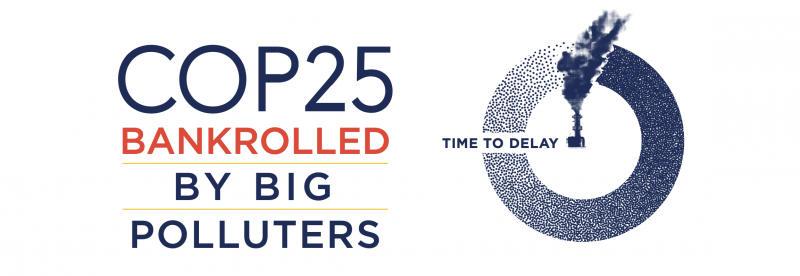
The €2 million also came with benefits: Iberdrola and Endesa both had giant exhibitions in the civil society-only ‘green zone’ (the UN considers business as civil society) where they could further promote their climate-friendly images. They also used their exhibition stands as key spots for lobbying: welcoming ministers and making big announcements to the press.
CEO was active both inside and outside the conference halls in exposing the role of big business in the climate crisis. Inside, we took the opportunity to illuminate the hypocrisy of the corporate presence in the ‘green’ exhibition space by giving Swedish Green MEP Alice Kuhnke a tour. Meanwhile, outside in the streets of Madrid, we were involved in organising a ‘toxic tour’ alongside the Gastivists, Banktrack, OMAL and Ecologistas en Acción. This walking tour shone a spotlight on the corporations sponsoring and attending COP25 (see this video from Channel 4 News, and this Spanish article).
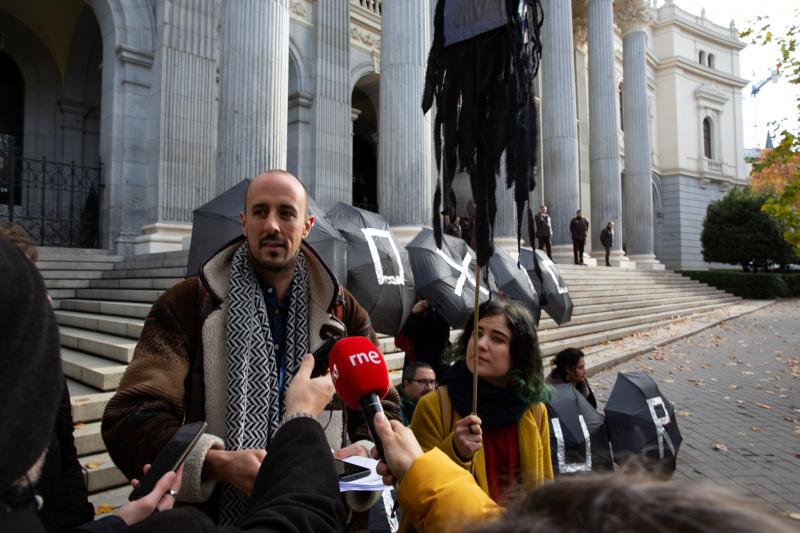
The tour fittingly began at the Spanish stock exchange, where shares in the IBEX35 are traded. It took in cultural as well as historical sites, highlighting the link between colonialism and climate change as well as the neo-colonial nature of modern-day gas extraction. One stop on the tour was the Museo del Prado, Spain’s most famous art museum, which is sponsored by Iberdrola and boasts a wing refurbished by Endesa that the company uses for PR exercises. These typical corporate ‘culture washing’ activities allow climate destroyers to cultivate a social presence and disguise their very dirty business model. Stood outside, Friends of the Earth Spain’s Hector de Prado explained how behind the ‘culture washing’, COP25 sponsor Endesa and its parent company Enel had been using carbon offsetting to make it look like they’d reduced their emissions at the expense of rural communities in Latin America.
The corporate tour coincided with the global ‘No to Carbon Markets’ day. As countries negotiated rules for a new global carbon market, as well as for a specific offsetting mechanism to replace the one introduced in 1997 at COP3 in Kyoto, activists inside and outside the meeting staged actions and events denouncing these moves. Dodgy accounting rules and loopholes mean that corporations and rich countries have so far been able to pay to ‘offset’ their emissions in poorer countries rather than cutting them at source – which the new mechanisms would only worsen (see box). The new briefing and a petition signed by 165 organisations, including CEO, show how carbon markets “have failed to reduce emissions or deliver real climate action. Under carbon market schemes, global emissions have continued to rise. As well as increased emissions, the legacy of carbon offsetting schemes so far has included conflict, corporate abuse, forced relocation, and threats of cultural genocide, particularly for Indigenous Peoples, smallholder farmers, forest dwellers, young people, women and people of colour.”
Big polluters still wandering the halls
Despite ongoing efforts over the past years to kick the fossil fuel industry out of the COP, the biggest polluters remain in the talks thanks to support by the EU and US of their presence. The list of registered participants contains no shortage of executives from fossil fuel companies: Shell, BP, Total, Eni, Enel, BHP Billiton, ENGIE, Rio Tinto and Equinor included. Likewise, their lobby groups were massively present in Madrid: the International Association of Oil & Gas Producers (IOGP), the International Emissions Trading Association (IETA) and BusinessEurope. Accredited lobby groups often bring their members into the talks on their delegations, and COP25 was no different: IETA alone had a delegation of 129 people, more than the delegations of South Africa, Nigeria or China. Included in this delegation were oil and gas majors BP, Total and Shell, as well as Endesa’s parent company, Enel.
IETA was one of the biggest pushers of carbon markets at COP25, using its ‘pavilion’ (an exhibition space with a conference room) to organise four to six events per day on carbon markets and related topics. Shell was involved in five IETA of them.
On the same day that indigenous communities, peasant farmers and climate justice groups took part in the global ‘No to Carbon Markets’ day, IETA and its members Shell, BP and Chevron announced a new joint initiative: ‘Markets for Natural Climate Solutions’. In short, turning forests and ecosystems into yet more failed carbon offsets. It’s known as both ‘natural climate solutions’ (NCS) or (confusingly!) ‘nature-based solutions’ (NBS). Although this type of offset has already led to widespread indigenous rights abuses and land grabbing, Shell Vice President Duncan van Bergen was full of praise at the launch of their newly-branded initiative. In response, half of those present in the room stood up, covered their ears and walked out in protest. The procession was led by Nigerian activists, who have been fighting the Anglo-Dutch giant for decades.
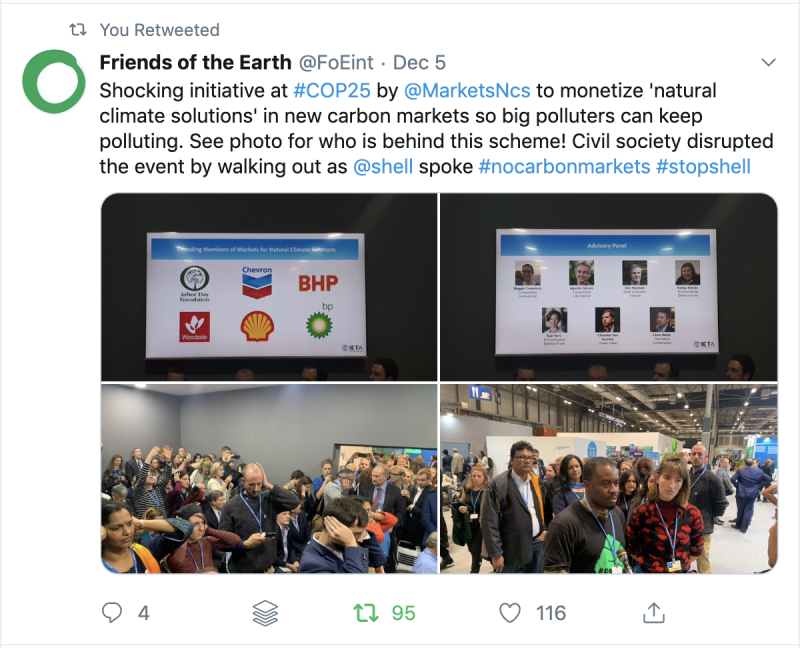
Youth climate strikers call out big polluters
The youth voice at COP25 was particularly strong, and the anti-corporate feeling – especially against fossil fuel corporations like Shell – was visceral. At the start of the second week of negotiations, youth strikers were waiting for Shell’s Van Bergen outside of an IETA event where he was speaking. They stood together with eyes drawn on their hands; a symbol from the Chilean anti-government protests. As Van Bergen left, they silently followed him, joined by teams of journalists and cameras. The message was clear: we don’t want you here, and we are watching you.
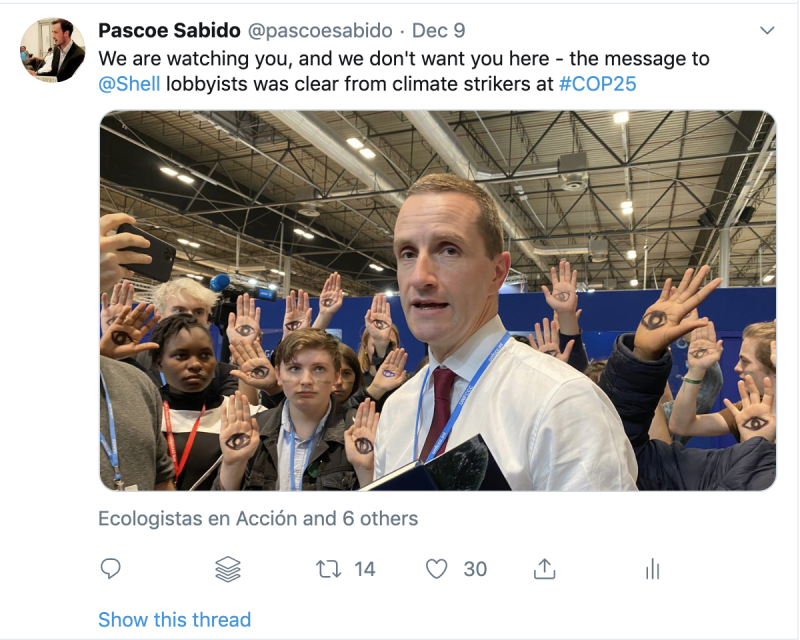
This wasn’t the first run-in between young people and big polluters: the previous week youth strikers – joined by CEO, Corporate Accountability and the Asian Peoples’ Movement on Debt and Development (APMDD) – had knocked on the doors of the UK, US and EU offices at the COP to hand over a petition. Signed by almost 200,000 people and more than 200 organisations, it demanded that those countries most responsible for the climate crisis hold corporations and CEOs liable.
https://twitter.com/AnnaVickerstaff/status/1202166012407435264
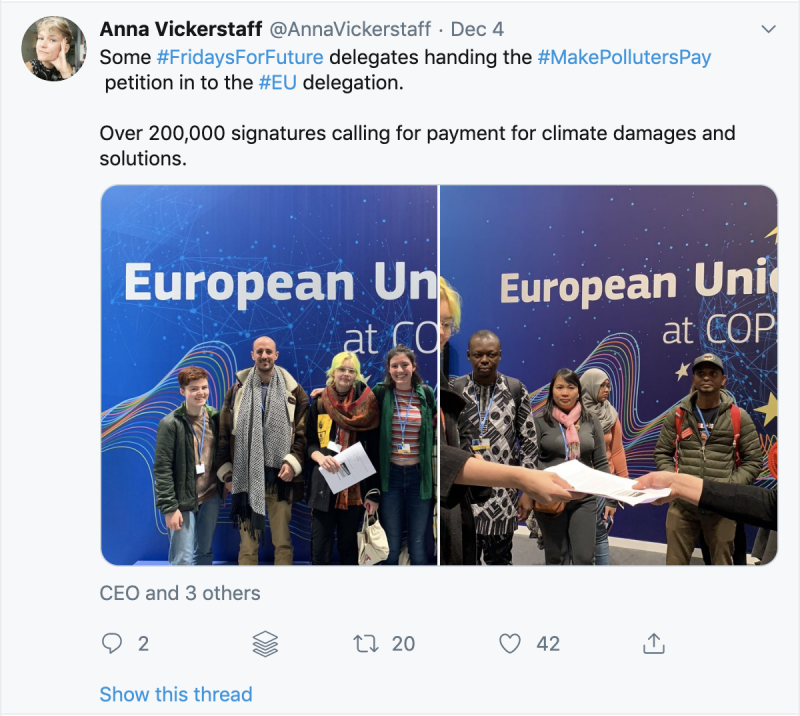
It’s a call that’s gaining ground around the world. While we were at the talks, the Philippines Commission on Human Rights ruled that the planet’s biggest polluters – including Shell, BP, ExxonMobil and Chevron – could be held liable for their contributions to climate change. Elsewhere, Shell and Exxon are facing court cases in the Netherlands and the US respectively. Rather than receiving up to a trillion dollars each year in subsidies, big polluters should be made to pay.
Ultimately, it was clear that today’s young people will not stand for greenwashing and marketing stunts. Greta Thunberg, the now-famous climate striker, told the COP25 plenary on 11th December: "I still believe that the biggest danger is not inaction. The real danger is when politicians and CEOs are making it look like real action is happening when in fact almost nothing is being done apart from clever accounting and creative PR." Following her speech, climate strikers from around the world invaded the plenary stage in protest at the lack of progress. But despite the amount of airtime and attention given to youth voices, the cold reality is that governments and the UN are not interested in listening unless it conforms to their agenda. Those who dissent are simply shut down.
Polluters in, people out
As the negotiations continued their downward spiral, civil society came together to take a stand. The talks were going disastrously: carbon markets full of loopholes were on the table, with no language protecting human rights or indigenous rights; and no money whatsoever being offered to help vulnerable countries pay for the damages caused by climate change. A peaceful action was organised inside the talks by indigenous communities, women and non-gender conforming folks, trade unions, climate justice groups and youth strikers. The message was simple: rich polluting countries needed to increase their ambitions and their financial offerings. #StepUpPayUp.
Although it had barely gotten started, the protest was violently shut down by UN security forces with women and people of colour were particularly targeted. A total of 320 people were shut out of the talks. While civil society was being forced out of the official space, the Executive Chairman of Santander, one of the fossil fuel-financing banks sponsoring COP25, was making an announcement to the plenary: the company would become carbon neutral by offsetting the emissions from its operations. This news is less than impressive when one recalls that just last year, the company gave close to €1 billion to Polish energy company PGE to build a coal-fired power plant.
Meanwhile, a similar dynamic was unfolding on the streets of Madrid. The second COP25 toxic tour of Madrid was shut down by the police, who arrived in large numbers and threatened to fine the tour guides up to €6,000 for “saying bad things” about the companies being targeted (see video). This was nothing compared to the state-backed violence that has been taking place on the streets of Santiago, but nonetheless a stark reminder of what happens when you challenge power.
Unity among those fighting back
Despite the hopelessness of the official talks, the mood in the streets was generally positive and there was a renewed sense of purpose and unity among civil society groups fighting for climate justice. Some 500,000 people turned out for Spain’s largest-ever climate demo on Friday 6th December, while the energy inside the alternative Cumbre Social por el Clima generated hope and inspiration. On the final Friday – nominally the last day of the negotiations although they were extended through the weekend – a mass sit-in took place inside the negotiating halls, led by Fridays For Future youth strikers but centring on indigenous communities, women and gender non-conforming folks. COP25’s failure was latent and widely acknowledged, and speaker after speaker underlined the need to go home and work harder, in spaces where we can build power and hold those currently in power to account.
We need #FossilFreePolitics
The failure of COP25 and the corporate agenda it tried to ram through is a symptom of a bigger problem: it is a mere extension of what happens back home in national capitals. The EU, the US, Australia and other big governments make their positions long before they arrive at official negotiations. Fossil fuel industry lobbying happens throughout the year, but the alignment of interests between regulator and regulated is the result of years of collaboration. In fact, those same corporations that have caused the crisis, including oil and gas companies and energy utilities, are at the heart of our governments.
During the second week of the talks, EU Vice President Frans Timmermans announced the European Green Deal, the continent’s master plan for reaching net-zero emissions by 2050 while still ensuring economic growth. The plan is based on climate targets that are not in line with the science, while the mechanism to deliver it is an extension of the EU’s failed carbon markets, plus continued reliance on fossil gas and great faith in techno fixes. It is business as usual painted a shade of green, leaving the same big industrial players to dictate its direction. It will not tackle the problem. However, the EU’s Green Deal provides an insight into why the UN climate talks are unable to deliver genuine change: its most powerful participants are clearly not ready to embrace it either.
Delivering genuine change means changing who is at the heart of politics and the way that decisions are made. We need to break open the close relationships between our decision makers and the fossil fuel industry: for the EU this does not just mean in Brussels, but also in national capitals. In October, CEO, Friends of the Earth, Greenpeace and Food & Water Action Europe launched a campaign to call for Fossil Free Politics in Europe. More than 200 organisations signed the call, demanding a firewall between decision makers and the fossil fuel lobby (similar to the measures taken against the tobacco lobby). COP25 was a further reminder of why this is necessary.
At the people’s counter-summit in Madrid, CEO and allies organised a public event on fossil free politics where campaigners from Spain, the Netherlands and the UK talked about the close relationship between domestic big energy companies and their governments. The UK will host COP26 next year, and activists from the UK Student Climate Network (UKSCN) made a clear case for why this must be a fossil-free COP.
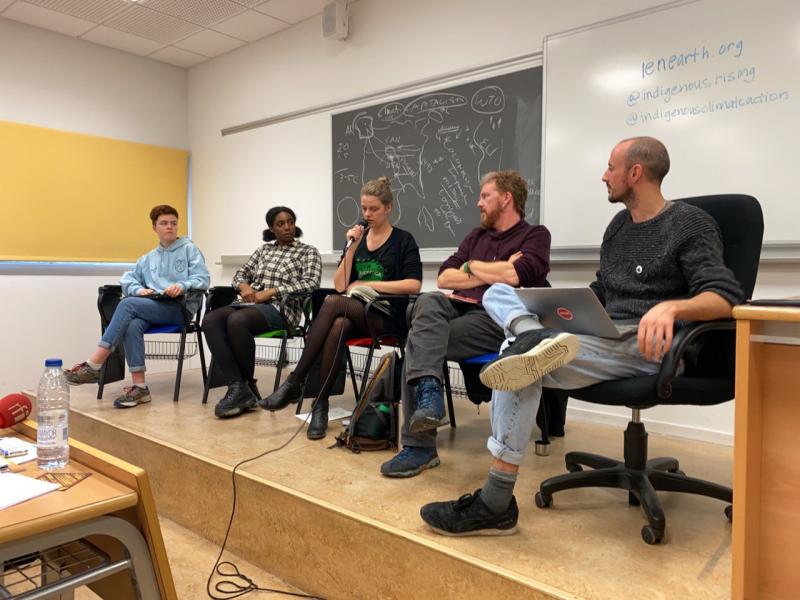
The fight against climate change is not just about emissions reductions: it’s about who emits them, and how. In short, it’s about the economy (stupid!) and who controls it. This was loud and clear at COP25, where decision makers sided with those currently in control. But this is also what will we will be fighting for in the streets throughout 2020. And it will be on the streets – not in the negotiating halls – where COP26 will be won or lost.
The failures of COP25: finance and markets
Although COP25 closed 40 hours later than planned, it still produced little of value for either the planet or its inhabitants. Incredibly, the gap between what the world needs and what multilateral governance is ready to deliver was even further widened. The decision on who will provide finance and how in order to deal with ‘loss and damage’ climate shocks was delayed until the next COP. The same goes for a decision on carbon markets under ‘Article 6’, although this was a relief given the deal on the table.
Markets: On one of the last days of the negotiations, more than 100 climate justice groups issued a joint statement. “Big Polluters and Northern countries [have been] throwing gasoline on the fire of the climate crisis, knowingly paving the way for even more fossil fuels,” they warned. According to Tina Stege, the climate envoy for the Marshall Islands, the rich countries’ proposal for carbon markets “symbolizes profits for their private sector and the chance to give the appearance that they are meeting their commitments while continuing to pollute and operate business as usual.” The plan that they tried but ultimately failed to push through was full of loopholes and accounting tricks, as well as constituting a serious threat to human rights and the environment.
Worryingly, corporate champions managed to insert language that could allow carbon markets to fund dangerous geo-engineering. Rather than just funding emissions reductions, the draft text also refers to “other non-greenhouse gas (GHG) emissions metrics”, which could include controversial solar radiation management (SRM). At the talks, the inclusion of non-GHG metrics was championed by Bhutan, who had COP veteran Andrei Marcu on its delegation. The former IETA CEO and ardent carbon market advocate has previously appeared in many other country delegations and government advisory roles to promote market-based approaches. The geo-engineering development will have to be confronted next year at COP26 in Glasgow.
Finance: Failure to agree on finance means that the burden of dealing with the impacts of climate change rests on the shoulders of the most vulnerable, who have also done the least to cause the problem. Led by the US, a country that will have left the Paris Agreement by COP26, rich countries spent the talks shirking their responsibilities in creating the climate crisis, and doing their utmost to avoid liability or provide compensation. The Warsaw International Mechanism for Loss and Damage, created seven years ago to provide financial help to those already being hit by climate disasters, remains empty, with no agreement on where the money will come from or how it will be distributed. Nonetheless, many richer countries continue to demand increased ambition from poorer countries, while reneging on decades-old commitments to provide the money and clean energy technology to allow them to do so. In effect, they are trying to destroy the hard-fought principle of ‘common but differentiated responsibilities’ (CBDR) that underpins the UNFCCC.

